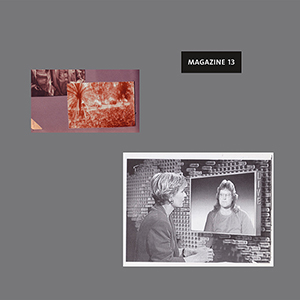Barnt Magazine 13
The music of Barnt (a.k.a. Daniel Ansorge) lies on a volatile faultline between melancholy and […]

The music of Barnt (a.k.a. Daniel Ansorge) lies on a volatile faultline between melancholy and ecstasy. For instance, his most recent EP for Hinge Finger, His Name, features a track (“Under His Own Name but Also as Sir”) that succinctly captures how the contradictions of light and dark can effectively be manipulated without diluting either element. On his debut album, Magazine 13, the Cologne-based producer has carried on in a similar fashion. Barnt cuts his tracks with big, rustic tools: a bass drum, ashen hi-hats and cymbals, and an unruly synth pitched high above the percussive fray that, when it comes to a fork in the road, will usually take neither path and will instead wander off somewhere else entirely. If that sounds like it could get formulaic quickly, then it’s a credit to Barnt’s imagination that the music never does.
In truth, nothing on Magazine 13 is as delirious as “Tunsten,” a track he released nearly two years ago on Cómeme. That song so thoroughly indulged its Freudian id that only its staunch adherence to the pleasure principle made it enjoyable enough to accept as a melodramatic dance record, as opposed to a cartoonish parody of one. Magazine 13 finds Barnt toning things down a bit, creating a set of introspective club records with atmospheric vignettes that work surprisingly well in the album format. The machines at his disposal may be rudimentary, but Barnt’s tracks—and particularly the melodies within them—are painstakingly detailed and instantly memorable. “Wigget: So we know that hexog****” (quite a few of these titles read like stream-of-consciousness computer code) opens the LP with a meandering series of synth melodies and parched percussion typical of Barnt’s repertoire. It might strike some as a little too cute at first—Barnt tunes can sometimes grate on the unfamiliar ear—but its unvarnished feel is ultimately what gives this, and the rest of Magazine 13, its charm.
Dance music producers with a raw approach to their craft and a passing knowledge of hip-hop will often cite RZA as an influence. It’s not known whether Barnt would do the same, but based on “22:25” alone, he could quite justifiably make the claim. Taking the album’s “less is more” credo even further here, the striking “22:55” is a simple pairing of scything digital string sorties and a bassy, on-the-nose 909 kick. It may not sound like much, but its sparseness ultimately showcases Barnt’s masterful way with melody; the track’s catchiness is such that it could carry the production by itself.
“Cherry Red,” clocking in at over 11 minutes, is Magazine 13‘s most boisterous, club-ready track. Its rat-a-tat cowbells and tissue-thin hi-hats carry the rhythm for a spell until some queasy top notes and a laser-like synth riff fill the song’s pockmarked surfaces. It’s a definite highlight, but many of the LP’s downbeat moments are equally compelling; furthermore, they give Barnt an additional outlet for his twisting compositions, ranging from the yearning pastoral feel of “Blame a Hill” to the bleached neon pulse of “1/1.”
Magazine 13‘s masterpiece, “All the alts I’mm holding are hurting,” distills all the album’s emotional shades into a 15-minute soliloquy of heartbreak. The track builds up and down with echoing finger snaps and other subtle rhythmic devices that foreground its quivering melodic motif, which initially trembles with a funereal solemnity. However, as more mournful notes join the procession, the song’s sorrowful stomp becomes a cathartic stride. It’s not entirely unreasonable to say that some of Barnt’s music is a bit over-the-top and showy by nature, but the tone struck on “All the alts I’mm holding are hurting” is so sincere that it feels confessional. It’s the sound of a machine pouring its heart out, but even at its saddest, the music still has a skip in its step. Magazine 13‘s emotional register may be rife with contradictions, but sinking into the album is never anything less than a joy.

